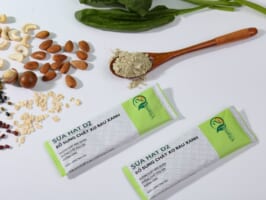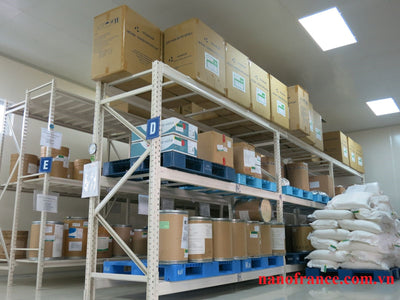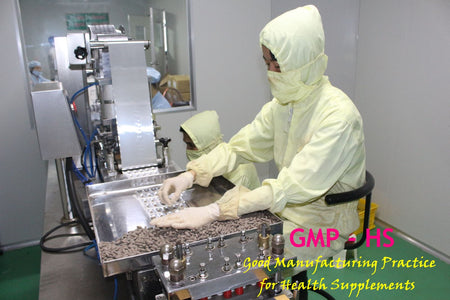Clinical trial on the use of turmeric in the treatment of gastric ulcers and hp bacteria
Clinical studies by scientists around the world on the uses of turmeric in treating gastric and duodenal ulcers and HP bacteria
Phase II clinical trial: Testing the efficacy of turmeric in the treatment of peptic ulcers.
Research authors: PrucksunandC , IndrasukhsriB , Leethochawalit, M , Hungspreugs K .
Research period: 2001.
The content of the test is as follows:
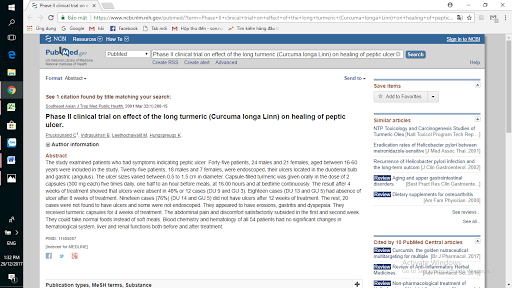
The trial was conducted on patients with peptic ulcers. The trial was conducted on 45 people: 24 men, 21 women, aged 16 to 60.
25 patients including: 18 men and 7 women, were endoscopy and determined the location of their ulcers in the stomach and duodenum. The size of the ulcers ranged from 0.5 to 1.5 cm. Each patient was prescribed to use capsules containing turmeric, each capsule containing 300 mg, using 2 capsules at a time, 5 times a day at times 30-60 minutes before meals, at 4 p.m. and before going to bed. The results after 4 weeks of treatment, the ulcers disappeared 48%, meaning 12 cases. 18 cases of ulcers disappeared after 8 weeks of treatment, 9 cases of ulcers were gone after 12 weeks of treatment.
The remaining 20 cases had no ulcers, inflammation and indigestion symptoms. All patients were prescribed turmeric capsules for 4 weeks of treatment. The symptoms of abdominal pain and discomfort were reduced in the first and second weeks of treatment. They could eat regular food or soft food.
There were no significant changes in blood counts, liver and kidney functions during treatment.
Anti-Helicobacter pylori effect test.
Authors: De R , Kundu P , Swarnakar S , Ramamurthy T , Chowdhury A , Nair GB , Mukhopadhyay AK .
Research period: 2009
Research Center: National Institute of Technology Kolkata, India.
The research content is as follows:
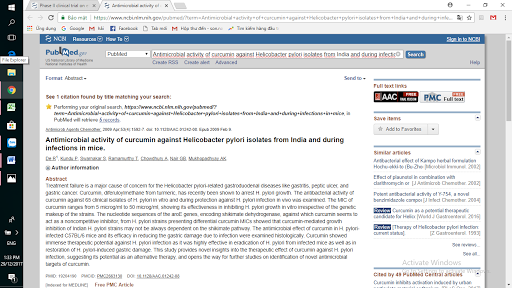
The reason for the loss of cells in the treatment of gastritis, duodenal ulcers, and gastric cancer is due to Helicobacter pylori bacteria. Curcumin, diferuloymethane from turmeric has recently been shown to inhibit the growth of HP bacteria. The antibacterial activity of Curcumin against 65 clinical strains of H. pylori in vitro and its ability to prevent reinfection with HP bacteria in vivo have been verified. The MIC of curcumin from 5-50 mcg/ml showed that its effectiveness in preventing H. pylori growth in vitro was independent of the genetic characteristics of the strains. The antibacterial effect of curcumin in C57BL/6 mice infected with H. pylori and its effectiveness in reducing infection-induced gastric damage were examined histologically. Curcumin shows great therapeutic potential for H. pylori infection as it was highly effective in eradicating H. pylori from infected mice as well as in restoring H. pylori-induced gastric damage. This study provides insights into the therapeutic efficacy of curcumin for H. pylori infection, demonstrates its potential as an alternative therapy, and opens the way for further studies on identifying novel antimicrobial targets of curcumin.
Above is information about clinical research of turmeric in treating gastric and duodenal ulcers and fighting HP bacteria. You can refer to the website: PUBMEB, a website that gathers information on clinical trials of countries around the world.

